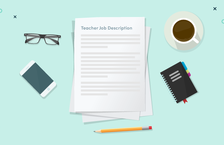The job of a teacher is challenging, versatile and extremely rewarding. Teachers are needed to support learners at all stages of life — from young children and college students to the highest level of education. They’re experts in the specialist subjects they teach, or work across the board, teaching a whole range of skills and topics.
Finding the right teacher means finding a person who can develop lessons based on an assigned curriculum, and deliver them in a way that is knowledgeable and engaging.
If you’re interested in advertising a teaching position, let us help you with an example job description (including typical requirements, and job duties and responsibilities), which you can use to create your own version.
Job overview
A teacher’s job is of high importance and can set the standard of learning throughout their students’ lives. A good teacher can have an impact on how a person views a certain subject, or even their own abilities.
The first part of your job description should focus on introducing who you are (or, if you’re a recruiter, who the employer is) and providing an overview of who you’re looking for and how they will contribute to the organization’s long-term goals:
Job overview
We are looking to employ a teacher with a talent for engaging learners and supporting their development through lessons, workshops and activities, devised and delivered in line with curriculum standards. You will be skilled in producing engaging content, and presenting material in a range of means to suit your learners needs and abilities.
You will have responsibility for assessing students, evaluating progress, marking work, and developing learning plans in the context of a safe learning environment, adhering to teaching standards and legal requirements.
We are looking for someone with excellent communication skills, who can adapt their style to suit the needs and level of your students, as well as implementing behavior management programs and knowing when to offer additional support.
Duties and responsibilities
Teachers will have varying duties and responsibilities depending on where they are teaching and whether they are responsible for a specific subject area (such as further education teachers) or teach a range of subjects (like elementary school teachers). Depending on how senior a teacher is, you may assign additional responsibilities, such as senior leadership duties or responsibility for a specific subject area.
The next part of your job description will focus on exactly what the role entails, like so:
Duties and responsibilities
- Design and deliver engaging lessons, content and materials, in line with standard curriculums and teaching standards.
- Vary learning mediums (for example: digital, visual, learning through action) in order to account for differences in learning preferences
- Provide a safe, enriching, engaging environment for students to learn and feel supported
- Conduct baseline assessments and follow up with formal and informal assessments to gauge learners’ progress
- Evaluate student progress and prepare reports for parents and other members of staff
- Mark students’ work, assessments and tests, providing grades or notes for improvement and ensuring positives are emphasized to encourage learning
- Communicating with learners, other teaching staff, stakeholders or governors and parents and caregivers
- Manage student behavior with behavior management plans, keep records of behavior, and monitor progress and signposting to necessary services
- Keep up to date with essential policies and standards, including child protection and safeguarding
- Participate in continued professional development through internal and external courses, seminars, conferences and events
Requirements
Requirements for a teacher will vary depending on the particular role and the level and age of the learners. Some teaching roles are in schools, and others are in colleges, universities and even in the community, and so may require different skills and qualifications. However, as a general rule, the standard requirements for a teacher will include the following, which should be demonstrated through both the candidate’s application and interview:
Requirements
- Postgraduate certificate in education or equivalent related to relevant field
- Previous experience in a teaching or training role
- Excellent communication skills, with the ability to adapt communication style according to audience
- Excellent interpersonal skills with the ability to build strong relationships with students, parents and other members of staff
- Highly developed written and verbal skills, with the ability to present effectively
- Thorough knowledge of teaching best practices, educational guidelines and legal requirements, and a sound understanding of relevant policies and procedures
- Highly organized with the ability to multitask and remain calm under pressure
- Creative and energetic, with the ability to lead, motivate, inspire and engage learners
Final thoughts
Finding teachers with the right skills for the job is essential, and it requires people who are fantastic leaders with the ability to inspire others, while having the knowledge in their subject areas and the communication skills to transfer their knowledge to their audience.
While qualifications and subject experience may differ according to the job role, the fundamental qualities and skills of a teacher are universal — no matter who, or what, they teach.
Got a question about writing a job description for a teacher? Let us know in the comments section below.
